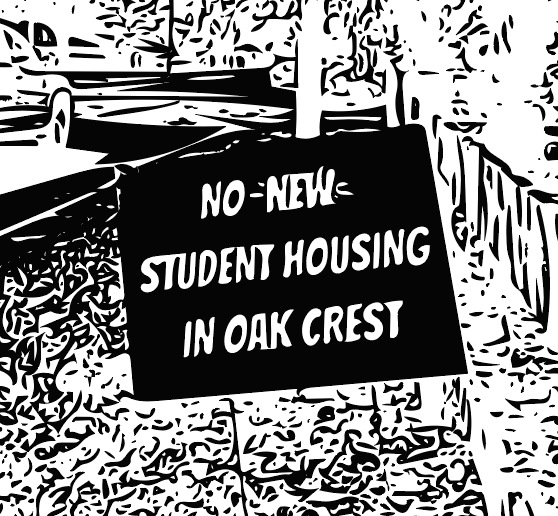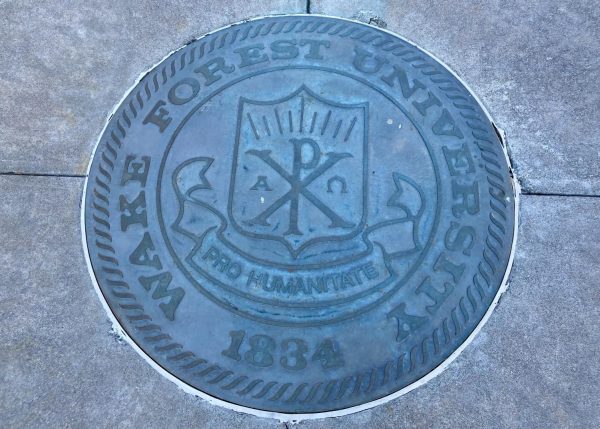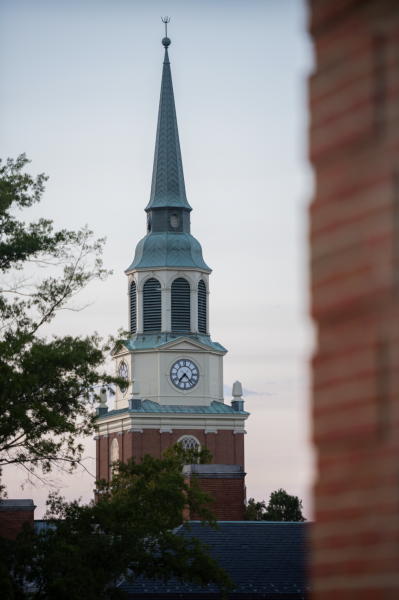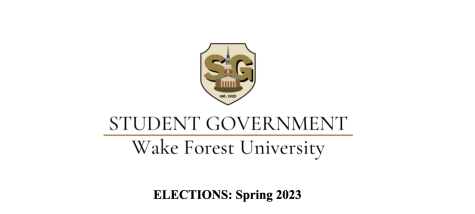Letter to the Editor: “Deactown” threatens property rights

Signs advocating against student housing do not target students, but developers, writes Professor Dean Franco.
October 6, 2022
As much as I admire the editors and journalists of The Old Gold and Black, I am disappointed by the paper’s September 21 mischaracterization of my neighborhood’s opposition to new student housing in the residential areas across from campus (“Wake Forest Students are Advised to be More Respectful to Their Neighbors”). The lawn signs referred to in the article do not object to students but to new student housing. My neighbors and I are specifically responding to the threat of new housing development on Freds Road (perpendicular to Friendship Circle). A 15 acreforest has been purchased by College Corner Properties and it is very likely that the owners will clear-cut the land to build cheap, disposable housing like the blight on Polo road just north of campus. We oppose the destruction of our neighborhood, not by individual students but by a real estate developer who has no hesitation about ending what has been a tranquil way of life for generations of residents. We also object to the way that developer’s project is silently hinged to the university’s broader expansion—its self-declared right to claim any and every acre of Winston Salem as “Deactown.”
Students are not the main threat to our neighborhood, though I understand why they are everyone’s presumed antagonist. It’s easy to obscure the university’s encroachment into the residential neighborhood over the decades by focusing on individual students’ behavior, as if it was simply a matter of conduct and personal responsibility. However, the issue is not how students behave but how and why the university leans on the local area to absorb the housing problems created by its admissions and growth plan. Yes, many students living in the area haveparties, make a lot of noise, discard trash along the road and on lawns, and generally disrupt the 9-5 lives of their adult neighbors. That’s not unique to Wake Forest and it’s been true of students as long as there have been students (it was true when I was a student. Hell, I was that student). Meanwhile, my adult, home-owning neighbors run their power tools at all hours of the day, spewing out noise and air pollution, and drive too fast on my street. The truth is, it’s hard for all of us to be good neighbors, and being a good neighbor is a constantly negotiated task.
This ethics of the neighbor are summed up by the straightforward logic of substitution: do for me what you’d want me to do for you. But the politics of the neighbor are difficult: where we live and how we live are determined by a political economy over which most of us have no control. In a city where the biggest economic and political driver is Wake Forest, the university creates the conditions that the rest of us have to live in. Given that the university’s over-admission of students all but mandates that students live in the neighborhood, it has created the conditions that increase demand for property, and which facilitate the spread of students onto my block.
When the owners of the property along Freds Road exert their right to clear and build, the deer that live in the forest will move on or die, along with the hawks and owls that roost there. The temperature of the neighborhood will increase at least 2-3 degrees, traffic will triple, noise will increase. The entire character of the neighborhood will change, and property values for residents will decrease. For its part, the university will continue to tut-tut and issue missives about student conduct, as if it had nothing to do with determining the conditions that destroyed a neighborhood. Wake Forest will tout character and leadership, and expect students to be the flag bearers of these virtues, but will never dare to challenge the shibboleth of property rights, let alone lead in a way that is good for the human welfare of its local-area residents. The well-intentioned admonition of students’ behavior is simply the further administration of the university’s cynical expansion and ruthless betrayal of its motto, Pro Humanitate.That’s what those signs are about.
Update Oct. 7, 2022: An earlier draft of this letter was errantly published in the Oct. 6 print edition and online. The letter above is the version that has been edited by the author and most fully reflects his thoughts.





















Jake • Oct 6, 2022 at 5:05 pm
As a geriatric academic and homeowner myself, I sympathize with the good professor. Loud parties, litter, and drunkenness are no longer my thing either. Nevertheless, with Wake Forest being a character-based college, it’s not like these students no matter how inebriated wouldn’t come to my aid if I were having a massive coronary in the front yard. And suppose Wake Forest, true to its protestations of Pro Humanitate and inclusion, had instead designated the woodland adjacent his home for public housing for just-off- the-boat Haitians? By what argument does the professor reconcile that ethical double bind? More finesse needed? Weeks of it probably. But, again, I do sympathize with the good professor. My neighbor has a barking dog and I sometimes have to use a box fan for white noise. And as for partying students, often as not a good poem works fine. Here, I’ll share couple with the professor (from Yeats and Stevens respectively):
Sailing to Byzantium
That is no country for old men. The young
In one another’s arms, birds in the trees
—Those dying generations—at their song,
The salmon-falls, the mackerel-crowded seas,
Fish, flesh, or fowl, commend all summer long
Whatever is begotten, born, and dies.
Caught in that sensual music all neglect
Monuments of unageing intellect.
An aged man is but a paltry thing,
A tattered coat upon a stick, unless
Soul clap its hands and sing, and louder sing
For every tatter in its mortal dress,
Nor is there singing school but studying
Monuments of its own magnificence;
And therefore I have sailed the seas and come
To the holy city of Byzantium.
O sages standing in God’s holy fire
As in the gold mosaic of a wall,
Come from the holy fire, perne in a gyre,
And be the singing-masters of my soul.
Consume my heart away; sick with desire
And fastened to a dying animal
It knows not what it is; and gather me
Into the artifice of eternity.
Once out of nature I shall never take
My bodily form from any natural thing,
But such a form as Grecian goldsmiths make
Of hammered gold and gold enamelling
To keep a drowsy Emperor awake;
Or set upon a golden bough to sing
To lords and ladies of Byzantium
Of what is past, or passing, or to come.
Disillusionment of Ten O’Clock
The houses are haunted
By white night-gowns.
None are green,
Or purple with green rings,
Or green with yellow rings,
Or yellow with blue rings.
None of them are strange,
With socks of lace
And beaded ceintures.
People are not going
To dream of baboons and periwinkles.
Only, here and there, [a Wake Forest student],
Drunk and asleep in his [loafers],
Catches tigers
In red weather.
Adrienne Pilon • Oct 11, 2022 at 1:18 pm
Gosh. This response to a thoughtful op ed is quite off-point. But poetry is always great.
Alex Hudson • Oct 12, 2022 at 8:35 am
My thoughts exactly! 🙂
Always interesting when a brief op-ed gets critiqued with the “whataboutism” as if it were a full treatise on the possibilities of who could live there.
Dean was addressing a specific article to clarify about the intent of a specific sign, that was designed in response to a specific builder who is in the very real business of college rental houses.